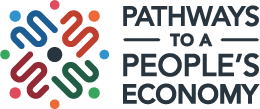Create and strengthen banks, community capital vehicles, and financial institutions that prioritize the communities they serve
We must create, strengthen, and scale financial institutions that deliver responsible, equitable, and affordable lending, including public banks, Community Development Credit Unions, and other alternative and accessible banking models.

Community Development Financial Institutions and Community Development Credit Unions
CDFIs are private financial institutions that are 100% dedicated to delivering responsible, affordable lending to help disinvested people and communities join the economic mainstream.
Credit Unions are financial cooperatives, owned by their depositors and governed along the principles of one member, one vote. And CDCUs are credit unions with a CDFI mission
Unlike Wall St. banks, which work to maximize profits for shareholders at the expense of communities and the environment, Community Development Credit Unions and Community Development Financial Institutions offer a local alternative rooted in the well-being of their communities.
Public Banks
Public banking is banking operated in the public interest, through institutions owned by the people through their representative governments. Public banking is distinguished from private banking in that its mandate begins with the public’s interest. Privately-owned banks, by contrast, have shareholders who generally seek short-term profits as their highest priority. Public banks are able to reduce taxes within their jurisdictions, because their profits are returned to the general fund of the public entity. The costs of public projects undertaken by governmental bodies are also greatly reduced, because public banks do not need to charge interest to themselves. Eliminating interest has been shown to reduce the cost of such projects, on average, by 50%. https://www.publicbankinginstitute.org/
Create and expand opportunities for easily accessible banking services, including municipal and state public banks and postal banking
Convert banks to public ownership after a financial crisis
For Example:
-
- When banks fail and must be rescued because of their own fraudulent activities, governments must convert them to permanent public ownership. Public dollar bailouts = public ownership!
Strengthen community development financial institutions.
For Example:
- Shared Capital Cooperative was established in 1978 and still works today! Shared Capital Cooperative is a national CDFI loan fund that connects co-ops and capital to build economic democracy. Their purpose is explicitly around community cooperative development and collective governance.
Create new exemptions, like Regulation Crowdfunding, for small, community investment funds from the 1940 Act, allowing them to file with state but not federal regulators.
- Currently, locally-focused, small investment funds must register their investment offering with state regulators in addition to filing with the SEC at the federal level, which presents a major compliance roadblock. An exemption would relieve small funds from the compliance burden, opening up opportunity for increased capital funding.
Expand the concept of crowdfunding operator to allow them to take deals other than Regulation Crowdfunding offerings, such as Direct Public Offerings.
- Currently, being registered as a broker-deal creates significant compliance burdens. The level of due diligence works for large firms but is prohibitively expensive for crowdfunding community capital, i.e. $50 or $100 investments. By expanding the concept of a crowdfunding portal operator that is exempt from broker-deal, these platforms could take on more and different types of offering, providing companies with more flexibility on how to market their investment offerings.
For Example:
- For more than 11 years, the nonprofit People’s Community Market has received national recognition for its many creative efforts to provide access to fresh produce, affordable groceries, and education about nutrition to a neighborhood of 25,000 people with no real grocery store. Out of this has grown People’s Community Market, which is using a DPO to raise $1.2 million to open a new, high-quality grocery store in the neighborhood. Investors purchased non-voting preferred stock with an annual 3% cumulative dividend. The corporation is not required to pay dividends or redeem stock for the first seven years of the investment. Investors also received a discount card that they can use at the store when it opens. The minimum investment was $1,000.

